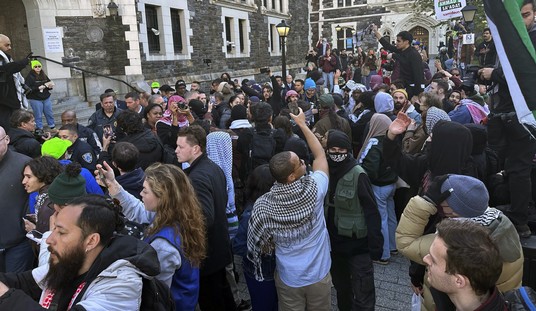The words in Genesis warning that “you must not eat from the tree of the knowledge of good and evil, for when you eat of it you will surely die” were never more apt than today. To understand why requires a detour to David Brooks’ article Florence and the Drones. Brooks argues from Machiavelli that all Princes must occasionally judge some men too dangerous to live — even when the Prince in question is the President and the men condemned are Americans.
Machiavelli … had a different concept of political virtue. … In the real world, a great leader is called upon to create a civilized order for the city he serves. To create that order, to defeat the forces of anarchy and savagery, the virtuous leader is compelled to do hard things, to take, as it were, the sins of the situation upon himself … Machiavelli tells us that men are venal self-deceivers, but then he gives his Prince permission to do all these monstrous things, trusting him not to get carried away or turn into a monster himself.
But Brooks adds one big proviso. Citing the Founders suspicion of unfettered power he concludes that the Prince should only be allowed to do “monstrous things” only insofar as he could be watched.
Our founders were more careful. Our founders understood that leaders are as venal and untrustworthy as anybody else. They abhorred concentrated power, and they set up checks and balances to disperse it.
Our drone policy should take account of our founders’ superior realism. Drone strikes are so easy, hidden and abstract. There should be some independent judicial panel to review the kill lists. There should be an independent panel of former military and intelligence officers issuing reports on the program’s efficacy.
If you take Machiavelli’s tough-minded view of human nature, you have to be brutal to your enemies — but you also have to set up skeptical checks on the people you empower to destroy them.
But Brooks leaves one detail out. The ultimate basis upon which a Prince decides to drone somebody — or not to drone that somebody — is information. Information that is presented, gathered and evaluated outside the formal courts of law is exculpatory or derogatory. It is what is determines whether the target lives or dies.
Much of this information is plucked from what used to be called “the ether”: from signals intelligence, computer forensics, network intrusions and things of that nature. Since the words that we speak, the knowledge we possess, the links that we make are increasingly kept on computers it is naturally this knowledge that the Prince wants to examine.
For that reason the Department of Homeland Security has claimed the power to engage in the “suspicionless” search and seizure up to within 100 miles inland of the nation’s border. This in the interests of national security. An example of what this means in practice was illustrated by this incident.
At an Amtrak inspection point, Pascal Abidor showed his U.S. passport to a federal agent. He was ordered to move to the cafe car, where they removed his laptop from his luggage and “ordered Mr. Abidor to enter his password,” according to the lawsuit.
Agents asked him about pictures they found on his laptop, which included Hamas and Hezbollah rallies. He explained that he was earning a doctoral degree at a Canadian university on the topic of the modern history of Shiites in Lebanon.
He was handcuffed and then jailed for three hours while the authorities looked through his computer while numerous agents questioned him, according to the suit, which is pending in New York federal court.
But stop for a moment to consider: what is your computer? Or equally vexing, where is your computer? In the case of Pascal Abidor it was a physical thing. But it is not always so physical. Many readers out there may have a GMail or Hotmail account. Where does that live? Suppose you had nothing but a Chromebook or a similar device which has nearly no local storage, storing all such applications and data ‘remotely’ — as we quaintly put it. Where is your computer then?
Suppose you enter a country without any computer at all and simply rent one past the 100 mile border limit? Is that your computer? The issue was more than hypothetical for three Americans of Palestinian descent who were stopped at Ben Gurion airport and told to log in to their Gmail accounts.
During her questioning, Doughman says her interrogator pointed a browser to gmail.com and said “log in.” Shocked, Doughman complied. The interrogator then searched through her email using keywords such as “Palestine” and “International Solidarity Movement,” occasionally reading lines out loud and writing down contact names and other personal info.
Their computers were apparently not even physically present. The information sought was online. The real issue, as the recent jurisprudence in the US courts shows, is really not about whether the government can access your computer. It is really about whether it can force you to divulge your password.
The state apparently could, until an 11th circuit court decision court reversed a lower court ruling. For the moment the issue is in the courts. Orin Kerr at the Volokh Conspiracy explains:
The important decision is In re Grand Jury Subpoena Duces Tecum Dated March 25, 2011. From the opinion by Judge Tjoflat:
We hold that the act of Doe’s decryption and production of the contents of the hard drives would sufficiently implicate the Fifth Amendment privilege. We reach this holding by concluding that (1) Doe’s decryption and production of the contents of the drives would be testimonial, not merely a physical act; and (2) the explicit and implicit factual communications associated with the decryption and production are not foregone conclusions.
First, the decryption and production of the hard drives would require the use of the contents of Doe’s mind and could not be fairly characterized as a physical act that would be nontestimonial in nature. We conclude that the decryption and production would be tantamount to testimony by Doe of his knowledge of the existence and location of potentially incriminating files; of his possession, control, and access to the encrypted portions of the drives; and of his capability to decrypt the files.
We are unpersuaded by the Government’s derivation of the key/combination analogy in arguing that Doe’s production of the unencrypted files would be nothing more than a physical nontestimonial transfer. The Government attempts to avoid the analogy by arguing that it does not seek the combination or the key, but rather the contents. This argument badly misses the mark. In Fisher, where the analogy was born, and again in Hubbell, the Government never sought the “key” or the “combination” to the safe for its own sake; rather, the Government sought the files being withheld, just as the Government does here. Hubbell, 530 U.S. at 38, 120 S. Ct. at 2044 (trying to compel production of documents); Fisher v. United States, 425 U.S. at 394–95, 96 S. Ct. at 1572–73 (seeking to access contents possessed by attorneys).
Requiring Doe to use a decryption password is most certainly more akin to requiring the production of a combination because both demand the use of the contents of the mind, and the production is accompanied by the implied factual statements noted above that could prove to be incriminatory. See Hubbell, 530 U.S. at 43, 120 S. Ct. at 2047. Hence, we conclude that what the Government seeks to compel in this case, the decryption and production of the contents of the hard drives, is testimonial in character.
Moving to the second point, the question becomes whether the purported testimony was a “foregone conclusion.” We think not. Nothing in the record before us reveals that the Government knew whether any files exist or the location of those files on the hard drives; what’s more, nothing in the record illustrates that the Government knew with reasonable particularity that Doe was even capable of accessing the encrypted portions of the drives. . . .
This throws into sharper contrast some of the issues touched on by David Brooks. Droning is not just about due process; it is inextricably connected with the issue of what the State can know and not know. The constraint on condemnation or exculpation is information. And you have to be careful that the state gets not only the parts that get you into trouble but also the parts that get you out of it. If page 1 may doom you and page 2 may save you, how much is in your interest to reveal to the state?
Some say all of it. Why not reveal all to the state if “you have nothing to hide”? The state assumes that whenever it can’t get at something, there is something to hide. In the 11th circuit decision quoted by Kerr, the state based its demand for a password on the fact that parts of the defendants hard disk were encrypted. And therefore they alleged it probable that the defendant had something to hide. But the defendant successfully argued that empty encrypted sections of the disk could be inaccessible. The state had no grounds for presuming that whatever was inaccessible was probably of a criminal nature. It could literally be nothing.
Of course many of us might conclude that one way to completely safe from the drones is to live your life like the Truman Show. In full view. With nothing hidden no guilt can be imputed. You hope. So while the debate over how to regulate drones has been centered around the question of due process, by its nature its resolution will involve to an almost equal degree the 4th and 5th Amendments.
Do you get to keep the contents of your mind and its aides-memoir secret? Perhaps not in all history have questions of knowledge become of such practical importance to the world. When a word can attract a drone and also deflect it, then access to what’s in your head can become very consequential.
The situation calls to mind a scene in CS Lewis’ Chronicles of Narnia. Children traveling through dimensions find themselves in an magnificent but dead city ruled by a Queen. They look out on the empty glory and asked how the city came to die. It died through the Deplorable Word.
Low down and near the horizon hung a great, red sun, far bigger than our sun. Digory felt at once that it was also older than ours: a sun near the end of its life, weary of looking down upon that world. To the left of the sun, and higher up, there was a single star, big and bright. Those were the only two things to be seen in the dark sky; they made a dismal group. And on the earth, in every direction, as far as the eye could reach, there spread a vast city in which there was no living thing to be seen. And all the temples, towers, palaces, pyramids, and bridges cast long, disastrous-looking shadows in the light of that withered sun. Once a great river had flowed through the city, but the water had long since vanished, and it was now only a wide ditch of grey dust.
“Look well on that which no eyes will ever see again,” said the Queen. “Such was Charn, that great city, the city of the King of Kings, the wonder of the world, perhaps of all worlds. Does your uncle rule any city as great as this, boy?”
“No,” said Digory. He was going to explain that Uncle Andrew didn’t rule any cities, but the Queen went on:
“It is silent now. But I have stood here when the whole air was full of the noises of Charn; the trampling of feet, the creaking of wheels, the cracking of the whips and the groaning of slaves, the thunder of chariots, and the sacrificial drums beating in the temples. I have stood here (but that was near the end) when the roar of battle went up from every street and the river of Charn ran red.” She paused and added, “All in one moment one woman blotted it out for ever.”
“Who?” said Digory in a faint voice; but he had already guessed the answer.
“I,” said the Queen. “I, Jadis the last Queen, but the Queen of the World.”
The two children stood silent, shivering in the cold wind.
“It was my sister’s fault,” said the Queen. “She drove me to it. May the curse of all the Powers rest upon her forever! At any moment I was ready to make peace—yes and to spare her life too, if only she would yield me the throne. But she would not. Her pride has destroyed the whole world. Even after the war had begun, there was a solemn promise that neither side would use Magic. But when she broke her promise, what could I do? Fool! As if she did not know that I had more Magic than she! She even knew that I had the secret of the Deplorable Word. Did she think—she was always a weakling—that I would not use it?”
“What was it?” said Digory.
“That was the secret of secrets,” said the Queen Jadis. “It had long been known to the great kings of our race that there was a word which, if spoken with the proper ceremonies, would destroy all living things except the one who spoke it. But the ancient kings were weak and softhearted and bound themselves and all who should come after them with great oaths never even to seek after the knowledge of that word. But I learned it in a secret place and paid a terrible price to learn it. I did not use it until she forced me to it. I fought to overcome her by every other means. I poured out the blood of my armies like water—”
“Beast!” muttered Polly.
“The last great battle,” said the Queen, “raged for three days here in Charn itself. For three days I looked down upon it from this very spot. I did not use my power till the last of my soldiers had fallen, and the accursed woman, my sister, at the head of her rebels was halfway up those great stairs that lead up from the city to the terrace. Then I waited till we were so close that we could see one another’s faces. She flashed her horrible, wicked eyes upon me and said, “Victory.” “Yes,” said I, “Victory, but not yours.” Then I spoke the Deplorable Word. A moment later I was the only living thing beneath the sun.”
From the Deplorable Word to the Deplorable Password. Power in our technological age is increasingly about information. Who said one couldn’t learn anything from Genesis? Or that magic was dead? Ask the snake, is the knowledge worth it, or what?
Or is the root of the problem the decision to fight terrorism through law enforcement? To convert war into a judicial process? War was by its definition is illogical and unbearable. War was madness, an insanity that could only be escaped through the door of victory. The administration has tried to furnish this madhouse with stupid idealistic tapestries, thereby making us think it possible to abide in what Sherman once called Hell.
The Three Conjectures at Amazon Kindle for $1.99
Storming the Castle at Amazon Kindle for $3.99









Join the conversation as a VIP Member